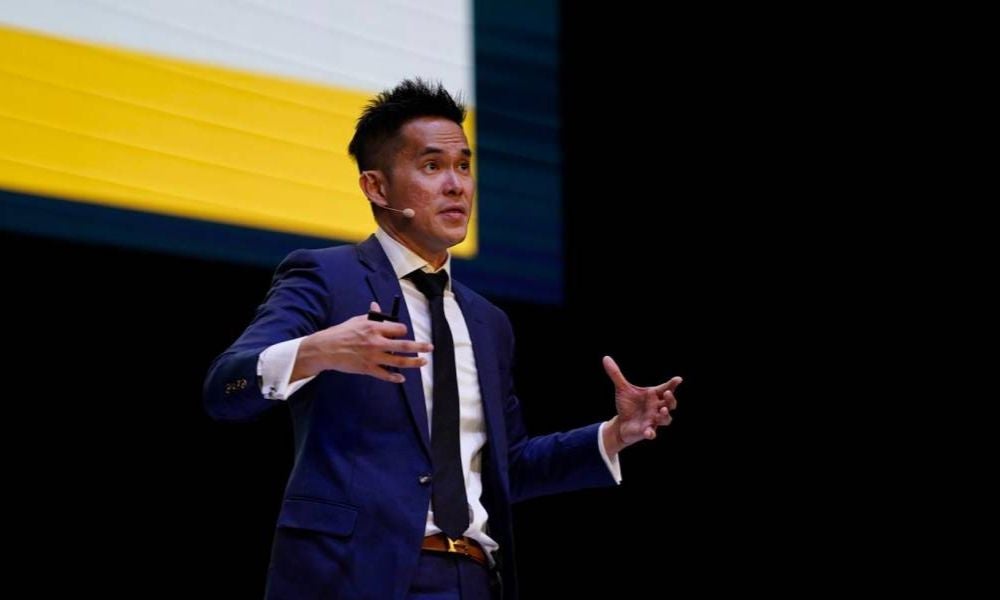Turo MD Robert Chan on the $1.5 trillion sharing economy revolution
Download The Business Of podcast on your favourite podcast platform.
Platforms such as Turo demonstrate that success in the sharing economy relies on managing trust, leveraging data, and understanding consumer demand
The sharing economy has exploded from a niche concept to a US$1.5 trillion global market, with Australia representing tens of billions of dollars across different asset types. Yet behind the success stories of platforms such as Uber and Airbnb lies a complex web of challenges that can make or break these platforms. For business leaders considering entering this space or adapting their existing models, understanding these dynamics has become essential.
Robert Chan, Managing Director of car-sharing platform Turo, summed up the purpose of the sharing economy with a simple analogy: "The average power drill is only on for 13 minutes of its life. You don't want (to buy) the power drill; you want (to fix) the hole in the wall,” he observed. "How do we get the benefit without having all the stuff is really what the sharing economy is trying to do.”
This shift from ownership to access represents one of the most significant business model innovations of the digital age, creating opportunities for entrepreneurs while fundamentally changing consumer behaviour patterns, according to Mr Chan, who was recently interviewed by Dr Juliet Bourke, Adjunct Professor in the School of Management and Governance at UNSW Business School for The Business Of, a podcast from UNSW Business School.
Understanding the sharing economy's true value proposition
The sharing economy operates on a deceptively simple principle. "It's quite a simple idea, which is the idea of 'what's mine can be yours'. It's peer-to-peer access to stuff, to things that we own, via a digital platform," Mr Chan explained. However, the real magic lies in what this enables for both sides of the marketplace.
For asset owners, the sharing economy transforms depreciating assets into income-generating opportunities. "What I think that allows people to do on the host side is actually to empower them to make income, earnings, on this asset that is usually depreciating," observed Mr Chan, a UNSW Business School Alumnus who graduated with Distinction in a Bachelor of Commerce. In Turo's case, the average host generates about $1000 annually from their vehicle in Australia, which can significantly offset the $450 weekly cost of car ownership, including loans, insurance, and registration.

The guest side reveals equally compelling value propositions that traditional business models struggle to match. While an average Uber trip lasts roughly 15 minutes, the average Turo trip extends to four days, serving completely different transportation needs. More importantly, Turo's peer-to-peer model provides access to 1500 different makes and models globally, from Suzuki Jimnys to Polestars, creating opportunities that traditional fleet operators cannot economically deliver.
This diversity advantage extends beyond mere variety. "If you are looking to test drive those cars, you can find all of that range on Turo, and that may not be the same experience with other providers," Mr Chan noted. In an automotive industry experiencing rapid change with new manufacturers entering the market, this access to variety has become increasingly valuable for consumers wanting to experience different vehicles before making purchase decisions.
Overcoming the trust deficit in peer-to-peer transactions
Trust represents the fundamental challenge that determines success or failure in sharing economy ventures. "How do you trust strangers with your car?" Mr Chan asked. "At the end of the day, it's about risk and reward." Building this trust requires sophisticated systems and careful community management that many businesses underestimate.
Successful platforms invest heavily in data science and risk management. "We have very sophisticated data science models that help us predict risk," explained Mr Chan, who said this is supported by "really good staff [and] teams on the ground, that help us track when things go wrong." Rather than profiling individuals, they focus on trip-specific risk assessment through their proprietary Turo Risk Score, developed over 13 years of operation.
Learn more: Solving China's car parking crisis with Airparking’s C2B2C solution
The approach to risk management also involves empowering hosts to make informed decisions about their comfort levels. Turo offers different protection plans where hosts can choose higher earnings with higher deductibles or lower earnings with comprehensive coverage. "That risk/reward trade-off is something that we empower those hosts to make, because they are entrepreneurs," Mr Chan said.
Building trust extends beyond risk mitigation to consistent delivery of brand promises. "At the end of the day, it's about delivering the promise – the brand promise that we presented – which is you get access to a car and it's the car that you booked that will show up when you show up to the car, and it will be clean and maintained, and you'll have a good trip," Mr Chan affirmed. When expectations are not met, successful platforms act decisively to maintain community standards and protect their reputation.
Why some sharing platforms thrive (while others fail)
Not every sharing economy venture succeeds, and the failures provide valuable lessons for business leaders. UNSW Business School Professor Barney Tan, who was also interviewed for the podcast, highlighted the cautionary tale of Mobike and Ofo, Chinese bike-sharing companies that collapsed despite significant venture capital backing and sophisticated technology.
"On the surface they were tech superstars. Backed by venture capital funding, they had all the technology – they had QR code unlocking, GPS tracking, mobile payments – everything was just neatly encapsulated in their apps," Prof. Tan explained. "But ultimately they failed because they neglected the offline realities," including bikes thrown into rivers, broken equipment cluttering streets, theft, and lack of local partnerships for logistics and maintenance.
This represents what academics call "the problem of tech without stewardship", where platforms expand rapidly without proper operational models for managing shared assets or ensuring quality experiences. "And when there's no clear operational model for managing the shared assets or ensuring a quality experience, these platforms quickly lose trust," Prof. Tan observed.

Successful sharing economy businesses require careful matching between product, platform, and ecosystem. "You need to ask yourself, is the item valuable but underutilised? Can users easily access and return the item? Are the risks manageable, and are there complementary services in place to support it?" Prof. Tan asked. "When all those boxes are ticked, the sharing economy thrives, but if you skip any of them, even the best technology can't save you."
The most successful sharing economy applications focus on high-value, underutilised assets that are expensive to own but easily transferable. This explains why accommodation, cars, and expensive tools work well, while attempts to share umbrellas, formal wear, or camping equipment often struggle due to 'transaction friction' that outweighs sharing benefits.
Strategic approaches for market entry and sustainable growth
Entering sharing economy markets requires careful strategic planning to overcome what Mr Chan described as "the cold start problem". Success demands building both sides of the marketplace simultaneously without oversupplying one side or creating excessive demand on the other. "When you have suppliers but no buyers looking for things, that's not going to work. When you have buyers but there's no suppliers, that's not going to work either," Mr Chan explained.
Turo's strategic approach involves deliberately keeping their take rate low during market entry to build a vibrant ecosystem. "One of the things that we do as marketplace managers is to invest in the marketplace, and one of the choices we can strategically make is to keep our take rate – our cut – very, very low. And we do that deliberately because we want a very vibrant ecosystem of hosts that want to make money on our platform, but also guests to try us," Mr Chan revealed. This represents a long-term investment strategy rather than short-term profit maximisation.
Subscribe to BusinessThink for the latest research, analysis and insights from UNSW Business School
Market localisation extends beyond obvious factors like metric systems and driving on different sides of the road. "The value of the cars is also very different... those are some of the nuances that we've had to adapt to and just be mindful of as we show guests different itineraries," Mr Chan noted. Even marketing approaches require adaptation, and he explained that Turo developed specific taglines with different phonics and colour approaches specifically for Australian audiences.
The network effects that emerge from operating across multiple markets provide competitive advantages that pure local players cannot match. Turo operates in Australia, Canada, the UK, France, and the USA, allowing it to leverage learnings and establish trust through demonstrated longevity and scale.
Future evolution and expansion opportunities
The sharing economy continues evolving beyond its original boundaries as platforms mature and identify adjacent opportunities. Turo already enables hosts to offer complementary items like child seats, surfboards, picnic baskets, and ski equipment, responding to local travel needs and increasing transaction values.
Future expansion involves extending the access model to longer-term arrangements. "We are looking at how we can look at the overall car ownership market for multi-month type access to cars as well," Mr Chan revealed. This flexibility addresses consumers who need vehicles for extended periods but want options to try different cars or adjust their transportation needs over time.

Insurance and protection services represent natural extensions as platforms develop deeper relationships with both hosts and guests. Mr Chan mentioned exploring different ways of providing, when the vehicle is not on a trip. "How do we provide protection and insurance to those cars as well?" asked Mr Chan, who said this vertical integration can improve unit economics while providing more comprehensive solutions.
The technology infrastructure that enables sharing can be applied to virtually any asset class where the fundamental value proposition makes sense. "We can do it to all types of assets," Mr Chan observed, noting existing Australian platforms for sharing boats and recreational vehicles. The determining factors remain whether the effort-to-earnings ratio works for hosts and whether the value proposition resonates with guests.
Five key considerations for sharing economy success
For leaders considering sharing economy opportunities, there are a number of strategic principles that support successful platforms. First, focus relentlessly on trust building and community management rather than just technology development. The most sophisticated apps fail without proper stewardship and operational excellence.
Second, carefully evaluate whether your target assets meet the sharing economy criteria of being high-value, underutilised, and easily transferable. Many failed platforms attempted to force sharing models onto products where transaction friction exceeded sharing benefits.
Learn more: Digital disruption: how can traditional businesses thrive?
Third, plan for the long term and resist premature monetisation. Building vibrant two-sided marketplaces requires patience and strategic investment in ecosystem development before optimising take rates or profit margins.
Fourth, invest heavily in risk management and data science capabilities. Successful platforms use sophisticated models to predict and mitigate risks while empowering participants to make informed decisions about their involvement.
Finally, consider how sharing economy principles might apply to your existing business model, even if you are not building a platform. The fundamental insight about consumers wanting benefits rather than ownership may reveal opportunities to restructure offerings around access rather than ownership, potentially reducing customer acquisition costs while improving utilisation rates.
The sharing economy represents more than a technology trend – it reflects a fundamental shift in consumer behaviour and business model innovation. Companies that understand and adapt to this shift position themselves to capitalise on one of the most significant market transformations of the digital age, while those that ignore it risk being disrupted by more agile competitors who better serve evolving customer needs.
